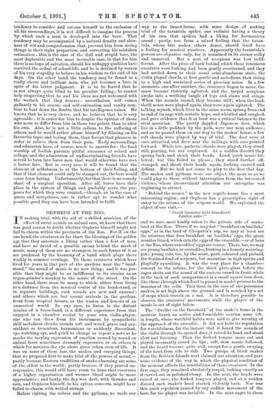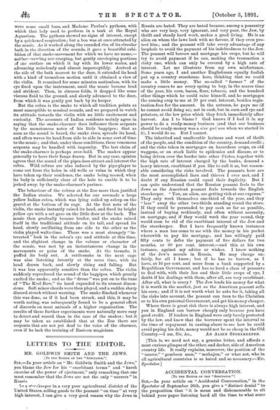ORPHEUS AT THE ZOO.
IN making trial, with the aid of a skilled musician, of the effect of sweet sounds on animal ears, we knew that there was good reason to doubt whether Orpheus himself might not fail to charm within the precincts of the Zoo. For if, on the one hand, the creatures so far share the blessings of the golden age that they entertain a liking rather than a fear of man, and have no dread of a possible enemy behind the mask of music, many of them are no strangers to such forms of it as are produced by the harmony of a band which plays there weekly in summer evenings. To those creatures which have lived for years in that part of the gardens near the 4` band- stand," the sound of music is no new thing ; and it was pos- sible that they might be as indifferent to its strains as an organ-grinder's monkey to the music of the street. On the other hand, there must be many to which, either from living at a distance from the musical centre of the band-stand, or in separate buildings, such sounds are new and unusual ; and others which are but recent arrivals in the gardens, fresh from tropical forests, or the wastes and deserts of an unmusical world. In any case, to listen to the distant strains of a brass-band, is a different experience from that enjoyed in a chamber recital by your own violin-player, one who can draw from his instrument by sympathetic skill melodious chords, sounds soft and weird, grave and gay, strident or tremulous, harmonious or suddenly discordant, eye watching eye, and quick to change or repeat a note as he marks the varying expression of emotion roused by sound on animal faces sometimes strangely expressive, or on others in which dor minutes the eye alone gives token even of life. It was on some of these last, the snakes and creeping things, that we proposed first to make trial of the powers of sound,— partly because Eastern traditions of snake-charming are some of the oldest in the world ; partly because, if they proved un- responsive, this would still leave room to hope that creatures of a higher organisation and warmer blood might be more appreciative ; and lastly, the day was dark, with thunder and rain, and Orpheus himself, in his sylvan concerts, might have failed to charm with wetted strings.
• Before visiting the cobras and the pythons, we made our
way to the insect-house, with some design of making trial of the tarantula spider, our violinist having a theory of his own that spiders had a liking for harmonious sound ; partly, too, from a mixed feeling that the taran- tula, whose bite makes others dance, should itself have a feeling for musical numbers. Apparently the tarantula's powers are objective only, for it remained in its corner sulky and unmoved. But a nest of scorpions was less indif- ferent. After the piece of bark behind which these venomous creatures were lurking had been gently overturned, and they had settled down to their usual semi-slumbrous state, the violin played chords, at first gentle and melodious, then rising to a high and sustained series of piercing notes. In a few moments, one after another, the creatures began to move, the mass became violently agitated, and the torpid scorpions awoke into a writhing tangle of legs and claws and stings. When the sounds ceased, they became still ; when the loud, shrill notes were played again, they were again agitated. The talking mynah, which lives in the same room, sprang from end to end of its cage with ecstatic hops, and whistled and coughed, and gave evidence that it at least was a critical listener to the rival musician. The pretty dappled Japanese deer, which live in a little paddock by the path, were our next audience ; and as we passed them on our way to the snakes' house, a few soft chords were played by way of trial. The deer were at once attracted, and drew near the railings, with ears pointed forward. While low, pathetic chords were played, they stood still, panting, but not unpleased. At a sudden discord they sprang back, and shook their heads. Loud, quick music fol- lowed; but this failed to please ; they stood further off, stamped, and shook their heads again, looking excited and defiant. But we had not come to play to the deer that day. The snakes and pythons were our object, the more so as we could play to these without interruption from the interested visitors, whose inconvenient attention our enterprise was beginning to attract.
"Behind the scenes" in the new reptile-house lies a most interesting region ; and Orpheus has a prescriptive right of entry to the arcana of the serpent-world. We explained the object of our visit,— " Cessit immanis mihi blandienti Janitor aulte !"
and we were most kindly taken to the private side of snake- land at the Zoo. There, if we may not "breakfast on basilisks' eggs," as in the land of Cleopatra's asp, we may at least see the creature that does breakfast on basilisks' eggs, the great monitor lizard, which eats the eggs of the crocodile,—or of hens at the Zoo, where crocodiles' eggs are scarce. There, too, we may see young basilisks, or crocodiles, frisking in a homely watering- pot ; young rats, too, by the score, parti-coloured and piebald, the destined food of serpents, but meantime in high spirits and playfully squeaking. It was the very place for a chamber- concert to the cobras, for the thick plate-glass before the cages shuts out the sound of the curious crowd in front, while in the back of each compartment is a small square iron door, like those through which food is passed in model prisons to the inmates of the cells. This door, in the case of the poisonous snakes, is set high above the ground, and is reached by a set of steps which travels on a rail. It is therefore possible to observe the creatures' movements while the player of the music is out of sight below.
The "dweller on the threshold" of the snake's home is the monitor lizard, an active and formidable saurian some 5 ft. in length, whose watchful habits were said to give warning of the approach of the crocodile. It did not belie its reputation for watchfulness, for the instant that it heard the sounds of the violin through its opened door, it raised its head, and stood alert and listening. Then the forked tongue came out and played incessantly round its lips ; soft, slow music followed, and the lizard .became quite still, except for a gentle swaying of the head from side to side. Two groups of black snakes from the Robben Islands next claimed our attention, and gave some evidence of the way in which the physical condition of the moment affects the sensibilities of these creatures. In the first cage, they remained absolutely torpid, looking exactly as if carved out in polished ebony. In the next, the heads were raised at once, the forked tongues played, and at a sudden discord each snake's head started violently back. Nor was this quick repulsion caused by any sudden movement of the bow, for the player was invisible. In the next cages to these were some small boas, and Madame Paulas's pythons, with which that lady used to perform in a tank at the Royal Aquarium. The pythons showed no signs of interest, except by a quickened respiration ; but a boa was at once attracted by the music. As it worked along the rounded rim of its circular bath in the direction of the sounds, it gave a beautiful exhi- bition of that snake-movement for which we have no name,— neither ,-.1.-avvling nor creeping, but gently enveloping portions of die surface on which it lay with its lower scales, and advancing noiselessly and almost imperceptibly. Arrived at the side of the bath nearest to the door, it extended its head with a kind of tremulous motion until it obtained a view of the violin. It remained for some minutes motionless, with its eye fixed upon the instrument, until the music became loud and strident. Then, in sinuous folds, it dropped like some viscous fluid to the ground, and slowly advanced to the door, from which it was gently put back by its keeper.
But the cobra is the snake to which all tradition points as most susceptible to musical sounds, and we prepared to watch its attitude towards the violin with no little excitement and curiosity. The accounts of Indian residents mainly agree in saying that the snake-charmer does influence these serpents by the monotonous notes of his little bagpipes ; that as soon as the sound is heard, the snake rises, spreads its hood, and often waves its head from side to side in some sort of time to the music ; and that, under these conditions, these venomous serpents may be handled with impunity. The last claim of the snake-charmer is perhaps over-bold. The snakes appear generally to have their fangs drawn. But in any case, opinion agrees that the sound of the pipes does attract and interest the cobra. Wild cobras are also induced by the pipe-player to come out from the holes in old wells or ruins in which they have taken up their residence, the snake being noosed, when its body is sufficiently clear of the hole to enable it to be jerked away, by the snake-charmer's partner.
The behaviour of the cobras at the Zoo more than justified the Indian stories. We selected for our serenade a large yellow Indian cobra, which was lying coiled up asleep on the gravel at the bottom of its cage. At the first note of the violin, the snake instantly raised its head, and fixed its bright yellow eye with a set gaze on the little door at the back. The music then gradually became louder, and the snake raised itself in the traditional attitude on its tail, and spread its hood, slowly oscillating from one side to the other as the violin played waltz-time. There was a most strangely " in- terested " look in the cobra's eye and attitude at this time, and the slightest change in the volume or character of the music, was met by an instantaneous change in the movements or poise of the snake. At the tremolo, it puffed its body out. A rattlesnake in the next cage was also listening intently at the same time, with its head drawn back, and slowly rising and falling. But it was less apparently sensitive than the cobra. The violin suddenly reproduced the sound of the bagpipes, which greatly excited the snake ; and as the "drone "was put on to the tune of "The Keel Row," its hood expanded to its utmost dimen- sions. Soft minor chords were then played, and a sudden sharp discord struck without warning. The snake flinched whenever this was done, as if it had been struck, and this, it may be worth noting, was subsequently found to be a general effect of discords on most animals of a higher organisation. The results of these further experiments were naturally more easy to detect.and record than in the case of the snakes ; but it may be taken as established that at the Zoo there are serpents that are not yet deaf to the voice of the charmer, even if he lack the training of Eastern magicians.



































 Previous page
Previous page